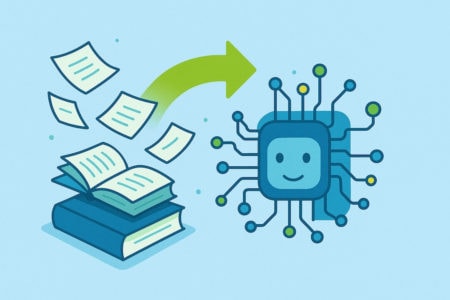By Constant Ondo
In large enterprises, knowledge is everywhere—stored in people’s minds, documents, informal conversations, databases, and information systems. Yet this wealth is too often ignored, siloed, or lost. In an era of rapid digital transformation, increasing employee turnover, and intense competitive pressure, knowledge management is no longer optional—it is a strategic imperative.
From Raw Data to Organizational Intelligence
Knowledge management is not just about storing documents in a content management system or centralizing procedures. It’s about capturing, structuring, sharing, and leveraging collective know-how so that every employee, every team, and every department can access the right information at the right time to make informed decisions. The goal is to turn scattered data into accessible intelligence.
In this field, a platform like PICC Software is redefining standards. With the help of artificial intelligence, PICC transforms an organization’s fragmented and often unspoken know-how into a structured, living, multilingual knowledge base that is accessible across the entire organization.
Collective Intelligence as a Performance Driver

According to recent estimates, large companies lose millions of euros annually due to lost expertise, redundant information searches, and inefficient knowledge transfer processes. The consequences include poor decision-making based on outdated data, duplicated efforts, prolonged onboarding, and slowed innovation.
Sharing knowledge can reverse this trend. It enables:
- Faster, more informed strategic decision-making
- Shortened onboarding time for new hires (up to 60% reduction with PICC)
- Lower operational costs through lessons learned and best practice sharing
- Better talent management by recognizing internal experts and structuring their contributions to the organization’s collective intelligence
In a fast-paced business environment where losing a single employee can mean losing critical expertise, knowledge management becomes a shield against organizational amnesia.
The Challenge of Information Silos
85% of large organizations suffer from information silos. Each department creates, organizes, and stores data in its own way, with little or no connection to other units. The result is incomplete databases, outdated documents, duplicated content, and scattered know-how. These silos significantly hinder productivity, innovation, and cross-functional collaboration.
PICC Software offers a concrete solution. Its AI—refined over more than a decade—analyzes all available sources (ERP, CRM, document repositories, emails, presentations, technical manuals) to build a digital twin of the company’s knowledge. This digital twin consists of “problem–solution” pairs that are contextualized, indexed, and accessible throughout the organization.
A Unique, Multilingual Approach
One of PICC’s strongest advantages is its ability to operate in all languages, eliminating a major barrier for international organizations. Whether the expertise originates in a German factory, a French R&D center, or an Asian sales team, it becomes immediately usable across the global group.
By centralizing knowledge, PICC also improves decision traceability, project documentation, and the cross-functional sharing of best practices. This transparency is critical in environments with strict regulatory demands, quality assurance processes, and rapid product development cycles.
Building Knowledge Capital to Prepare for the Future
 Effective knowledge management doesn’t just boost present-day performance—it is an investment in the future. Every resolved issue, analyzed failure, and processed customer feedback becomes part of the company’s collective intelligence.
Effective knowledge management doesn’t just boost present-day performance—it is an investment in the future. Every resolved issue, analyzed failure, and processed customer feedback becomes part of the company’s collective intelligence.
PICC Software supports this knowledge capitalization through several specialized modules:
- PICC-HR, to structure human capital, reduce knowledge loss when employees leave, and measure individual contributions to organizational intelligence
- PICC-MI, dedicated to managing knowledge for innovation, strategy, and continuous improvement
- An intuitive mobile interface that provides real-time access to validated solutions, even in the field
Aerospace company Tecalemit Aerospace adopted PICC to formalize critical know-how, accelerate team upskilling, and ensure knowledge transfer in a highly regulated environment.
Fostering a Culture of Structured Sharing
One of the main obstacles to effective knowledge management is the reluctance to share. Many employees prefer to rely on personal experience or ask colleagues directly rather than consult a formal knowledge base. This reality requires a cultural shift: it’s not enough to store information—it must be structured, dynamic, and useful.
This is exactly what PICC enables with its continuous feedback capture system. Every project, conversation, and document becomes a potential source of knowledge. The AI identifies, extracts, and updates the company’s knowledge map in real time. This approach prevents repeated mistakes, highlights individual contributions, and creates a dynamic organizational memory.
A Powerful Lever for Innovation and Competitiveness
Knowledge management should not be viewed as a documentation task. It is central to innovation, time-to-market efficiency, and solving complex problems. PICC-MI identifies high-potential projects, cross-references feedback, and helps deploy the most relevant, field-validated solutions.
This ability to drive innovation while protecting core expertise is especially valuable in volatile environments, where adaptability determines who leads and who follows.
Conclusion: Turning Knowledge into Competitive Advantage
In a world where value lies not only in physical assets but in the ability to learn faster than the competition, knowledge management becomes a critical success factor. For large organizations, it is a lever for performance, a vector for resilience, and an accelerator of innovation.
Platforms like PICC Software make this vision achievable. By structuring collective intelligence, eliminating silos, recognizing internal expertise, and anticipating future needs, they transform what was once seen as an abstract initiative into a tangible engine of long-term competitiveness.
Knowledge is capital. In the digital age, it’s time to use it to its full potential.


